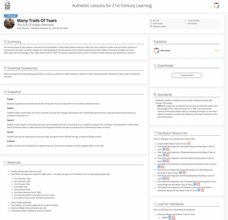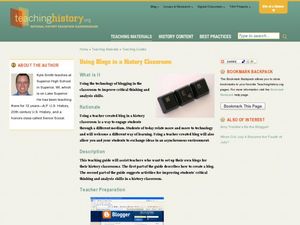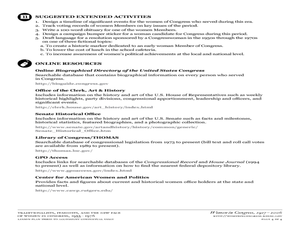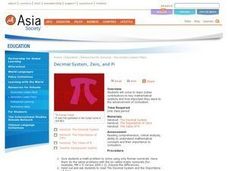Penguin Books
A Teacher's Guide to the Signet Classic Edition of William Shakespeare's Antony and Cleopatra
Was Antony "transformed/Into a strumpet's fool," as Philo declares? (I, i) Was Cleopatra "green in judgment"? (I,5) A guide to Antony and Cleopatra, Shakespeare's tragedy, provides instructors with a framework for teaching the play about...
Anti-Defamation League
Building Alliances
Bystander or up-stander? The final instructional activity in the "Looking Back Reaching Forward" unit asks participants to consider how they can become involved in encouraging change in their school and community.
Anti-Defamation League
With All Deliberate Speed
Has the integration of U.S. schools proceeded "with all deliberate speed?" Has progress been made? Those are the questions young historians must consider as they examine the barriers to and opportunities revealed in a study of timelines...
Anti-Defamation League
Dealing with the Social Pressures that Promote Online Cruelty
Why do people engage in cyberbullying? What can be done about it? These are the questions middle schoolers consider in a very timely lesson. Participants view PSA announcements, read a case study, and participate in scenarios designed to...
Core Knowledge Foundation
Unit 6: The Genius of the Harlem Renaissance Teacher Guide
Introduce your seventh graders to the Harlem Renaissance with a unit that explores this dynamic period's music, literature, and ideas. The 160-page guide includes a unit calendar, an introduction to the unit, 10 richly detailed lessons...
K20 LEARN
Lord of the Flies Unit, Lesson 4: Bad to the Bone
Is the nature of humans inherently good or evil? That is the question scholars consider in the fourth lesson of the Lord of the Flies unit. In a Four Corners activity, they examine statements about human nature and stand by the poster...
K20 LEARN
Many Trails of Tears: The Era of Indian Removal
Cherokee, Chickasaw, Choctaw, Creek, and Seminole. All were forced off their ancestral lands in the southeastern United States as part of the Indian Removal Act of 1830. Young historians research the tribes' reactions to this removal and...
K20 LEARN
Worcester v. Georgia: Cherokee Sovereignty and Actions of the U.S. Government
Young historians study the Supreme Court case "Worcester v. Georgia" and note instances where the Justices defended the sovereign rights of the Cherokee. They also examine the actions of President Andrew Jackson and the provisions of...
Academy of American Poets
Teach This Poem: “Thanksgiving” by Ella Wheeler Wilcox
Victor Laredo's painting "On the Beach" and Ella Wheeler Wilcox's poem "Thanksgiving" allow young scholars to use their noticing skills. Class members identify elements of the painting the artist uses to create the feeling of his work....
Academy of American Poets
Thanksgiving with Richard Blanco's "América"
Traditions, like the times, are a-changin'. Middle schoolers conduct a close reading of Richard Blanco's poem "América" and consider how Blanco's family approached his suggestions for adopting a new approach to their Thanksgiving meal.
K20 LEARN
Mob Mentality and "The Outsiders": Integrating Fiction and Nonfiction
S. E. Hinton's The Outsiders allows middle schoolers to reflect on mob mentality. After reading an article and watching a video about herd mentality, class members find examples in the novel of when characters go along with the crowd and...
C3 Teachers
Black Genius: How Did Black Genius Help Build American Democracy?
"How did the slavery system undermine the United States' democratic principles?" This question launches a study of how the Preamble to the Declaration of Independence, Article I, Section 2 of the U.S. Constitution, and Article IV,...
C3 Teachers
Reparations: Why Are Reparations Controversial?
To understand why the topic of reparations is controversial, young scholars gather background information by reading articles, watching videos, and examining cases where reparations were made. Learners consider the lasting repercussions...
C3 Teachers
African Americans and the Civil War: How Did African Americans Experience the Civil War?
To understand African Americans' involvement in the United States Civil War, high schoolers gather evidence from primary source images, census reports, and documents. As a summative performance task, individuals craft an argument,...
National Endowment for the Humanities
Seeing Sense in Photographs & Poems
Learners analyze photographs and poetry as forms of each other. In this poetry and photography analysis lesson, high schoolers use the photographs of Alfred Stieglitz and poetry from William Carlos William to explore how poetry and...
Curated OER
Using Blogs in a History Classroom
Students blog their way through history. In this historical perspectives activity, students use teacher-created blogs to log their impressions and opinions regarding the historical events they are studying. Steps are included for setting...
Curated OER
Digging up the Past
Students explore history through archaeology. In this critical analysis instructional activity, students work in teams to recreate a model of the archaeological discoveries made in the excavations at Monticello. This instructional...
MEP: Demonstration Project
Unit 5 Probability Activities
Wow! Here is a 14-page package of activities to use when your math class is studying probability. There are a myriad of pertinent experiments for learners to try, such as rolling a self-constructed multi-faced three-dimensional...
Curated OER
The Human Population
In this human population worksheet, students are given data about the size of the human population from the 1800s to 1999. They plot the data and answer critical thinking questions about the changes in human population.
Curated OER
A Changing of the Guard: Traditionalists, Feminists, and the New Face of Women in Congress
Students explore the role of women as Congressional leaders. In this women's rights lesson, students identify and investigate the impact of women representatives and senators in the U.S. Legislative Branch. Comprehension questions, data,...
Curated OER
Decimal System, Zero, and Pi
Students explore Indian contributions to mathematics. In this mathematics history lesson plan, students examine the decimal system, zero, and pi as contributions from the Indian culture.
Baylor College
Heart and Lungs
With a partner, youngsters measure their pulse and breathing rates, both at rest and after running in place for a minute. While this activity is not novel, the lesson plan includes a large-scale classroom graphing activity and other...
Curated OER
"I" Witness to History
Young journalists write diary entries from the point of view of a person involved in a historical event. They focus on including facts, clear narration, and accurate description of the individual's feelings.
Curated OER
"War of the Worlds": A Broadcast Re-Creation
Why did Orson Welles' 1938 Broadcast of a adaptation of H.G. Wells' The War of the Worlds cause such a panic? To answer this question, class members listen to the original broadcast and research the panic that resulted. They then engage...

























